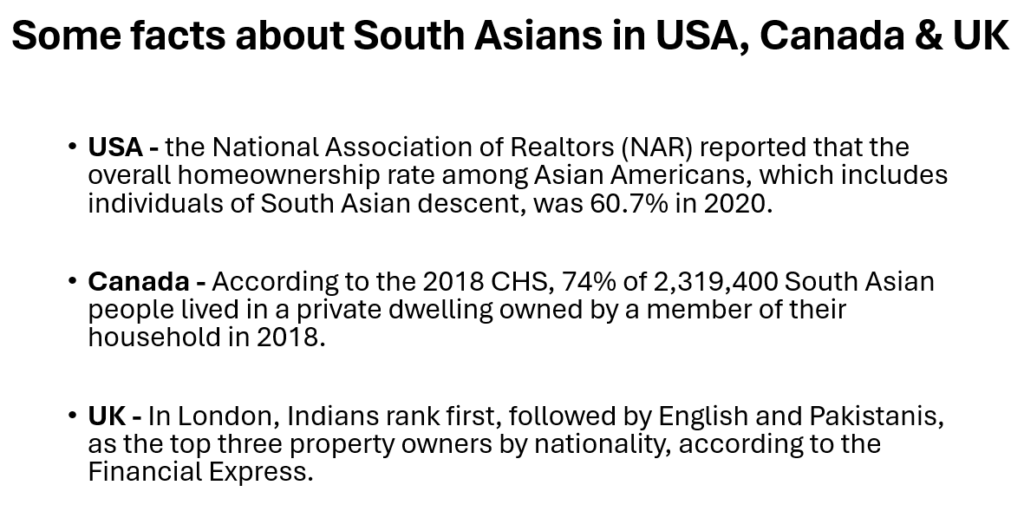Dr. Tausif Malik
In a troubling development sweeping through neighborhoods, homeowners across the cities in the US are confronting a growing menace: squatters infiltrating their properties. With scant legal safeguards for property owners and seeming favoritism towards tenants’ and squatters’ rights by city authorities, residents find themselves feeling exposed and helpless within their own dwellings.
Instances of squatters seizing vacant homes, unlawfully occupying properties, and resisting eviction efforts have become alarmingly frequent, leaving homeowners exasperated and seeking remedies to shield their properties.
The problem is exacerbated by what many perceive as lenient laws tilted in favor of tenants and squatters over property owners. US City officials have enacted measures ostensibly aimed at safeguarding tenants’ rights, such as extending eviction moratoriums and imposing stringent criteria for property owners to repossess their homes.
Squatters aren’t just a concern in the USA; they’re also causing issues in Canada and the UK, as reported by The Guardian, BBC, and CBC.
In Canada, CBC News reported a rise in squatters occupying vacant homes, particularly in urban areas like Toronto and Vancouver. The article highlighted the challenges faced by homeowners in reclaiming their properties due to legal complexities and lengthy eviction processes.
Similarly, The Guardian and BBC have both covered squatting issues in the UK, with reports indicating a surge in squatting incidents, especially in London. The articles shed light on the legal framework surrounding squatting in the UK and efforts by authorities to address the problem through legislative measures.
Consequently, homeowners are left pondering what steps they can take to fortify their homes against encroachment and occupation by squatters. Although legal avenues exist, they are often protracted, expensive, and offer no assurance of success.
In response to the escalating squatting crisis in California, a group of concerned individuals has taken matters into their own hands, establishing a business dedicated to removing illegal tenants from properties reports Newsweek.
During the COVID-19 pandemic, several states adjusted their rental regulations to offer more leniency to struggling tenants. However, in states like California and Washington, this leniency has inadvertently facilitated a surge in squatting incidents, leaving property owners facing substantial financial losses. Recognizing the need for action, Lando Thomas, a business owner based in Southern California, has been actively removing squatters since 2018. In 2023, Thomas joined forces with others to launch a specialized company aimed at addressing the issue of unruly and illegal tenants on homeowners’ properties reports Newsweek.
Beverly Grove, known for housing some of California’s elite, including A-list celebrities, entrepreneurs, and investors, witnessed a stark shift when squatters infiltrated the area in October. Locals have voiced complaints about the squatters hosting raucous parties allegedly involving drugs and other illicit activities reports Curbed and LA Times.

The impact of squatting extends beyond individual homeowners to affect broader aspects of homeownership, the economy, and social issues.
- Homeownership: Squatting poses a significant threat to homeownership as it undermines property rights and security. Homeowners may face financial losses due to property damage caused by squatters or legal expenses incurred during eviction proceedings. Moreover, the fear of squatting can deter individuals from investing in real estate, leading to a decline in homeownership rates and property values.
- Economy: Squatting can have adverse effects on the economy by impeding property development and investment. The presence of squatters in vacant properties can deter potential buyers or tenants, reducing demand in the real estate market. Additionally, the costs associated with squatting-related legal proceedings and property maintenance can strain homeowners’ finances and deter economic growth.
- Social Issues: Squatting exacerbates social issues by contributing to housing instability and homelessness. In areas with high squatting rates, vulnerable populations may struggle to access affordable housing, leading to overcrowding, displacement, and increased homelessness. Moreover, squatting can strain community relations and exacerbate tensions between homeowners, squatters, and local authorities.
Addressing the impact of squatting requires comprehensive strategies that balance the rights of property owners with the needs of vulnerable populations. This may involve implementing stronger legal protections for homeowners, providing support services for individuals at risk of homelessness, and promoting affordable housing initiatives to address housing shortages and reduce squatting prevalence. Additionally, public awareness campaigns and community engagement efforts can help foster dialogue and collaboration between stakeholders to mitigate the adverse effects of squatting on homeownership, the economy, and social well-being.
Protective Measures for Homeowners
- Regular Property Inspections: Homeowners are advised to conduct routine inspections of their properties, particularly if left vacant for extended durations, to identify unauthorized occupants or signs of forced entry.
- Secure Vacant Properties: Vacant properties should be securely locked, with reinforced doors and windows, along with adequate lighting and surveillance cameras to deter trespassers.
- Stay Informed: Keeping abreast of local laws and regulations concerning squatters’ rights and eviction procedures is crucial for homeowners to comprehend their rights and legal recourses.
- Seek Legal Counsel: In the event of a squatter occupation, homeowners should seek guidance from proficient property attorneys who can navigate them through the eviction process and safeguard their interests.
- Document Everything: Homeowners must meticulously document all interactions with squatters, including written notices, communications with city officials, and evidence of property ownership, to bolster their case in legal proceedings.
Despite the formidable challenge of squatters invading homes, homeowners are urged to maintain vigilance and proactivity in defending their properties. Armed with the requisite knowledge, resources, and legal support, homeowners can assert their rights and reclaim their homes from unlawful occupants.
Legal Framework and Data
The legal framework surrounding squatters’ rights varies across states and cities. In many jurisdictions, squatters may acquire legal rights to a property through continuous occupation for a specified period, ranging from days to years.
According to data from the National Law Center on Homelessness & Poverty, approximately 3.5 million individuals experience homelessness in the United States annually, with a considerable portion resorting to squatting for shelter.
Notably, Florida Governor Ron DeSantis recently signed a bill, HB 621, facilitating the immediate eviction of squatters in the state. Prior to this legislation, squatters were considered tenants, necessitating a formal eviction process. However, the bill strips squatters of these rights, enabling law enforcement to promptly remove unauthorized occupants without prolonged legal procedures.
In New York, lawmakers have grappled with similar challenges, with some advocating for reforms to expedite the removal of squatters from properties. Instances of homeowners facing prolonged battles to reclaim their residences underscore the urgency for comprehensive legal reforms and support services for vulnerable populations.
In a bipartisan effort to address the escalating issue of squatting, a comprehensive package of bills was introduced in Albany on Wednesday. The proposed legislation seeks to enact stricter laws and streamline eviction procedures to combat the growing crisis.
Assemblymember Jake Blumencranz highlighted the urgency of the situation, stating, “Our state is currently facing a squatting crisis.” Joining forces with landlords and fellow members of the New York State Assembly, Blumencranz unveiled Assembly Bill 6894, designed to close legal loopholes and provide homeowners with a more effective means of removing squatters from their properties.
Explaining the core objective of the bill, Blumencranz emphasized its simplicity: “Assembly Bill 6894 is simple. It would allow lawful homeowners to remove squatters by redefining squatters as trespassers rather than tenants under New York state law.” This reclassification aims to empower property owners with clearer legal recourse to swiftly address the issue of unauthorized occupation on their premises.
Leonel Moreno, a Venezuelan migrant who gained attention for a TikTok video advising fellow migrants to “invade” U.S. homes and assume the role of “squatters,” has been taken into custody pending further immigration proceedings.
The arrest took place on Friday in Gahanna, Ohio, and Moreno is currently being held at the Geauga County Jail. U.S. Immigration and Customs Enforcement (ICE) confirmed that Moreno had “illegally entered the country” on April 23, 2022.
Following his apprehension, Moreno was enrolled in ICE’s Alternative to Detention program, which employs technology and case management to monitor compliance with release conditions.
The encroachment of squatters into residential properties poses a grave threat to homeowners’ rights and security. As communities grapple with this unsettling trend, concerted efforts by policymakers, law enforcement, and legal authorities are imperative to ensure that homeowners are afforded adequate protection and recourse against unlawful occupants.
Some facts about South Asians in USA, Canada & UK
USA – the National Association of Realtors (NAR) reported that the overall homeownership rate among Asian Americans, which includes individuals of South Asian descent, was 60.7% in 2020.
Canada – According to the 2018 CHS, 74% of 2,319,400 South Asian people lived in a private dwelling owned by a member of their household in 2018.
UK – In London, Indians rank first, followed by English and Pakistanis, as the top three property owners by nationality, according to the Financial Express.
About the Author
Dr. Tausif Malik is a social entrepreneur, publisher, and academician, renowned for his innovative ventures. He founded and publishes The Desi Buzz, GCC Startup News, Startup Berita, and Halal Biz News, amplifying entrepreneurship globally. Dr. Malik also spearheads AIMBSN, Halal Angels Network, and Startup Villages, fostering startup ecosystems. His groundbreaking initiative, RiseBack.org, offers affordable edtech solutions, providing Indian university programs starting at $50 per month and professional IT courses priced at $250-$350. Through his diverse endeavors, Dr. Malik empowers individuals with access to education and opportunities.


